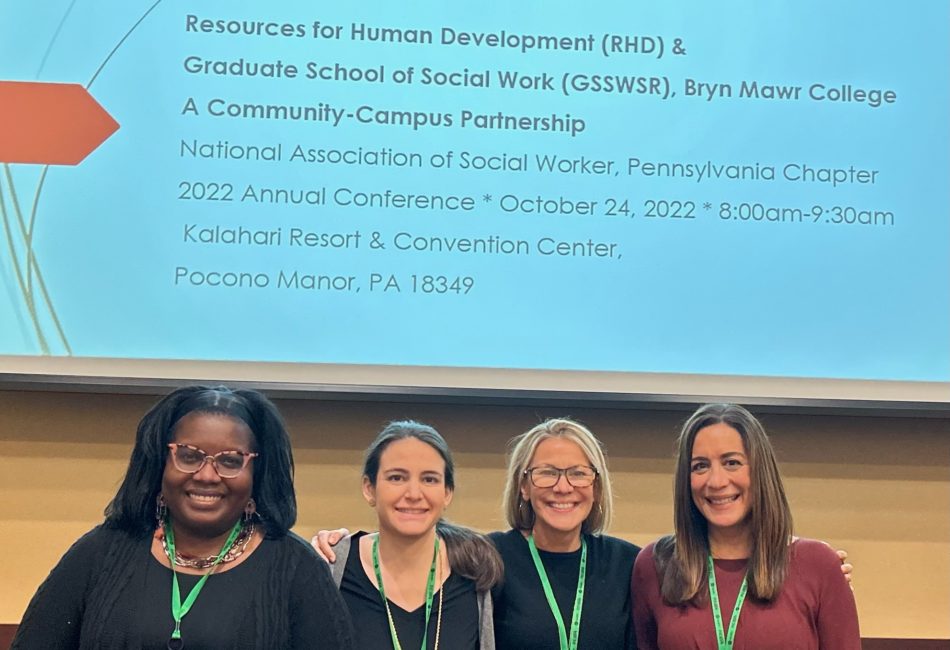RHD Joins Forces with Bryn Mawr College For Innovative Trauma-Informed Care Study

November 2, 2022
“I don’t think there’s anything more powerful than hearing the voices of people that are doing this really hard work, every day.”
Pamela Kasinetz, Clinical Director for RHD’s Behavioral Health and Housing (BHH) Division, is talking about the results of a recent study on the effects of trauma-informed care when applied to RHD’s homeless services. The study is the culmination of several years of collaboration between RHD and the Graduate School of Social Work and Social Research (GSSWSR) of Bryn Mawr College.
On October 24, representatives from RHD, along with others, unveiled the study’s findings through a presentation titled, “At the Intersections of Historical Trauma: Lessons for Providing Trauma Informed Care” at the 2022 Annual Conference of the National Association of Social Workers – Pennsylvania Chapter (NASW-PA). Kasinetz, Susan Hunt, also a Clinical Director of the BHH Division, and Emily Spector, Director of Business Data Analytics, were presenters, and Tamarah Moss, Assistant Professor for GSSWSR, co-presented (GSSWSR Dean Janet Shapiro, another important contributor, unfortunately could not attend). The NASW-PA conference marked the first external presentation of these findings.
Trauma-informed care is a framework for human service delivery that is based on knowledge and understanding of how trauma affects people’s lives. It is also a key element of RHD’s mission. The tenets of trauma-informed care inform every facet of RHD – from the services our programs provide to the interpersonal relationships between departments.
But there is still so much more to learn about how best to use trauma-informed care in a way that benefits both RHD program’s staff and participants. In 2019, RHD and GSSWSR officially joined forces to begin the study. Because of a gap in research and literature around trauma-informed care and homeless services, the focus of this study felt particularly urgent.
The study had several goals. One key goal was to identify RHD staff’s beliefs, knowledge, and attitudes concerning trauma-informed care. Another important goal was to develop best practices for trauma-informed care in the homeless services sector based on staff members’ recommendations.
In terms of logistics, RHD identified several programs, and the names of 15 staff members who work in those programs, to participate in the survey. The recruited staff members were selectively chosen to represent different positions, as well as diversity in gender, age, and length of tenure with RHD. GSSWSR conducted the interviews and staff members were kept anonymous to maintain privacy within RHD.
The interviews began in 2020, and then the COVID-19 pandemic happened. The team quickly realized that the study was already uniquely set up to capture staff’s feelings about working during the pandemic, so they didn’t have to start from scratch. Spector says, “We were already in the position to gather data reflecting people’s experiences with COVID through the survey we put together. We added one question to our interview protocol to be sure that we were asking specifically about COVID, and It was ready to go.”
Kasinetz agrees. “The people in these service lines were going to work every day in the early stages of the pandemic. They were under a lot of stress and feeling the uncertainty in the world at that time. Their responses really do reflect how folks were feeling when providing services to vulnerable people during COVID, while also feeling vulnerable themselves.”
Following interviews, GSSWR began analysis and coding in order to develop the narrative and themes of the study. The results and recommendations that came out of this study were many and varied. However, the RHD team were able to pinpoint a couple key discoveries that further emphasized the importance of trauma-informed care.
Hunt says, “RHD has done a lot of work to develop trauma-informed care training for all staff. Through this study, we learned that on the ground in these programs, staff are really having these conversations, using trauma-informed language, and trying to address it with staff and participants. So, that was very encouraging.”
The study also has the potential to help others. Kasinetz explains, “The study is tailored to people who are interested in understanding what implementing trauma-informed care in a large agency looks like.” Spector adds, “One of our goals is to fill a gap in the literature, put this out there, and help other organizations.”
Another important discovery from the study – one that can serve as an instructive tool for other organizations — is the focus on building relationships. Hunt says,
“At all levels it is really the key to being trauma-informed – genuinely taking the time to listen to staff and understand that when we all come into work, we’re not just blank canvases. We all come in with our own histories and experiences. We need to make sure we are always addressing that and supporting each other.
“Having space to talk about things is essential.”
To learn more about RHD’s BHH Division, visit www.rhd.org/program_area/behavioral-health/.


